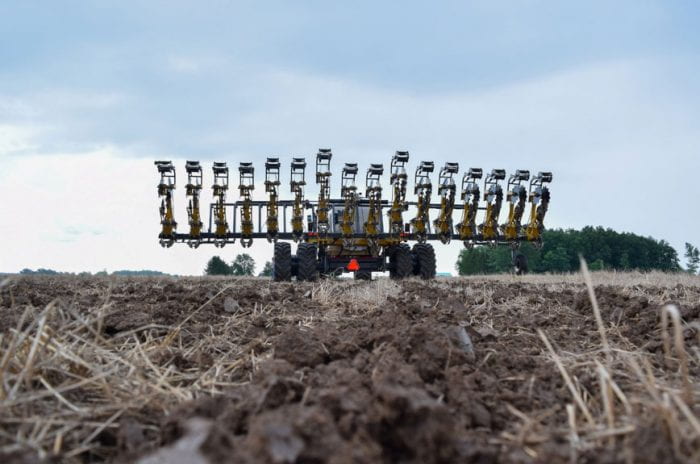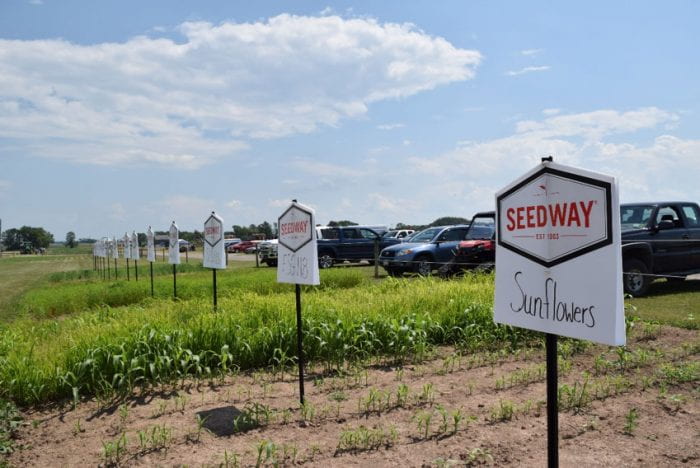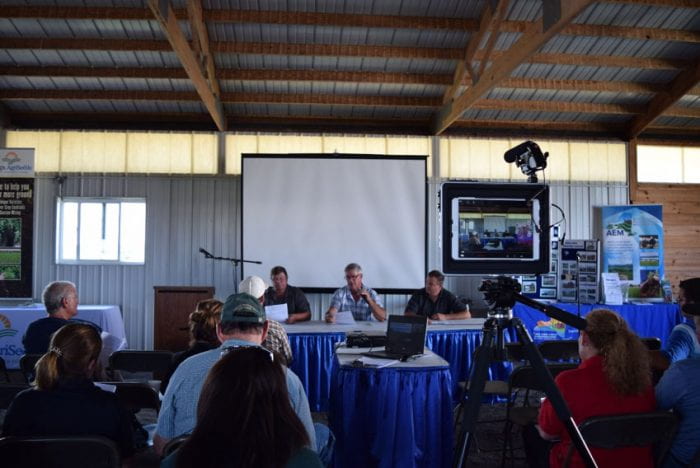
Tabletop soil demonstrations showed farmers how soil managed with good practices retains better structure, is less prone to erosion, and stores more water for crops. Photo credit: Haley Rylander
Driving through the countryside of the Finger Lakes in summer, one passes fields of swaying corn, hears the rumble of tractors, while the waft of cattle smells filter through the air conditioner. The fields seem endless, the mood peaceful. Then flags appear on the horizon. Sandwiched between grain fields and pastures are 300 acres of tents, booths, tin buildings, demonstration fields, and exhibits. It’s August in New York and time for the biggest outdoor agricultural trade show in the Northeast: Empire Farm Days, held at Rodman Lott and Son Farms in Seneca Falls.
Empire Farm Days began in 1931 when the Empire State Potato Growers Association hosted an event for farmers and industry to share the newest techniques, equipment, and information to improve agricultural production in the region. Eighty-eight years later, the trade show is still going strong.
There is almost a fair-like atmosphere at the event, with food trucks, ice cream, livestock, horse riding demonstrations, and even a blood donation trailer. Massive tractors and tractor implements line lots between walking paths, and nearby fields host demonstrations on hay mowing and baling, tillage, manure injection, drone sprayers, and cattle handling. Programs range from dairy management to hemp production. Cornell University has a large building showcasing agricultural research alongside tastings of fresh-roasted sweet corn and apples.
Amidst the show sits the Soil Health Center. Since 2015, the New York State Interagency Soil Health Working Group and Empire Farm Days have worked together to host seminars, farmer panels, tabletop demonstrations, and tours aimed at improving soil health practices on farms. The New York Soil Health initiative joined in this year to help organize the speakers and farmer panels.
This year the center’s events doubled as workshops for the Practical Soil Health Specialist Training Program, a NE-SARE funded project by the American Farmland Trust and Cornell Soil Health Program.
Harold Van Es, professor of soil and water management at Cornell, gave a keynote on the geographic connections of soil health in a historical and geological context, and how these connections present opportunities for New York agriculture. For example, redistributing resources from nutrient and carbon-rich systems (dairy farms) to nutrient and carbon-poor systems (grain and vegetable farms).
Jim Hershey, president of the Pennsylvania No Till Alliance, explained how no-till practices over the long-term can improve soil health and suppress weeds. Hershey detailed how he uses cover crops to improve the no-till system on his farm in the form of “planting green” and cover crop interseeding.
Other talks included management of reducing tillage for vegetable growers, pest and disease control in no-till systems, and the effects of reduced tillage on beneficial insects.

A 16-row strip tiller only disturbs the soil where a crop will be planted, leaving strips of high-carbon residue between plants to reduce erosion, increase organic matter, and suppress weeds. Photo credit: Haley Rylander
Tillage is the inversion or mixing of the soil before planting a crop, typically using a plow mounted on the back of a tractor. Tillage kills and buries weeds and the residue from past crops and creates a smooth surface to plant seeds into, but it also degrades the structure of the soil. Heavily tilled soils lose organic matter, reduce their ability to hold water, form hard, cracked surfaces, and are more prone to erosion. One way to help reduce tillage on farm is to use cover crops between cash crop planting to prevent erosion, alleviate compaction, suppress weeds, and add organic matter to the soil.

Cover crops improve soil structure, suppress weeds, and increase the organic matter and nutrient content of soil between cash crop plantings. Photo credit: Haley Rylander
Just outside the Soil Health Center, a live demo of 35 different cover crop monocultures and mixtures put on by Kings AgriSeeds and SeedWay showed farmers diverse options to meet the individual needs of their farms. Field demonstrations of reduced-till equipment showed farmers options to reduce tillage on their farm.

Farmer panels allowed farmers to share their personal experience with no-till, nutrient management, and cover crops, and answer questions from farmers. Each of three panels was filmed to allow more farmers access to the information online. Photo credit: Haley Rylander
Farmer panels on nutrient and cover crop management in no-till systems allowed farmers to share their personal experience and answer questions from other farmers. Farmers shared how reducing tillage increases the water-holding abilities and the structural integrity of their soil, making it more resilient to both droughts and flooding.
“It just keeps things running. Plus, we don’t have to worry after having a heavy rain if all the soil’s going to wash away,” said John Kemmeren, owner of Angel Rose Dairy. Kemmeren was highlighting how soil health management practices make running a dairy farm more efficient.
Other farmers explained how they overcame social and technical challenges transitioning to no-till systems, and how soil health practices can be adapted to diverse systems, such as vegetable farms.
As many as 60 farmers at a time attended the panels, seminars, and tours at the Soil Health Center, ranging widely in age, gender, and type of farm, from small-scale vegetable farms to large-scale dairy operations.
When surrounded by 300 acres of fanfare, flags, tents, and a heavy focus on profit, efficiency, and the latest tech, it’s good to know that soil health is still on the minds of many farmers. Without healthy soil, those endless fields of corn, cows, vineyards, and vegetables in the Finger Lakes wouldn’t exist.
The New York Soil Health initiative continues to reach out to farmers of all backgrounds and types, promoting environmentally-sound management practices while still improving overall farm resiliency and long-term profitability so we can keep the summer roads of the Finger Lakes as peaceful and productive as they are today.
This article originally appeared in the Morning Ag Clips.